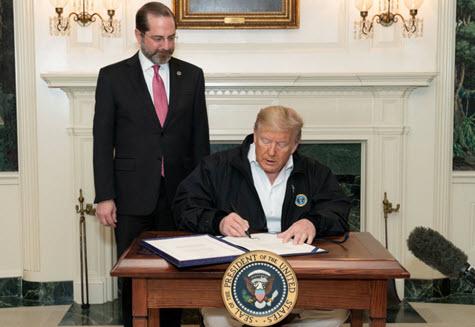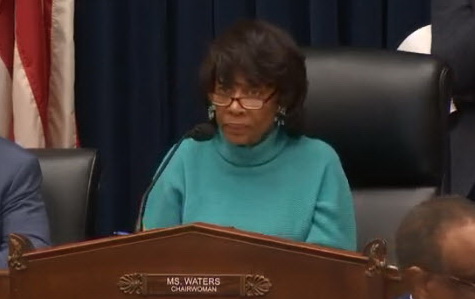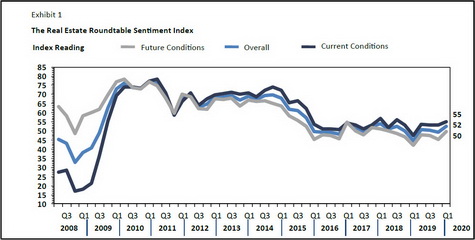
Central banks around the world took dramatic action this week to mitigate the economic fallout of the coronavirus pandemic.
- The Federal Reserve Bank of New York announced a bold move yesterday to pump a series of cash injections totaling more than $1.5 trillion of temporary market liquidity into markets and begin buying longer-term bonds.
- This week’s actions are designed to mitigate investor fears as the Dow Jones industrial average plummeted more than 2,300 points yesterday – a 10 percent drop that is the worst one-day decline since the 1987 crash. (Wall Street Journal and Federal Reserve Bank of New York, March 12)
- “These changes are being made to address highly unusual disruptions in Treasury financing markets associated with the coronavirus outbreak,” the New York Fed said in its March 12 announcement. The short-term funding move was directed by Fed Chairman Jerome Powell, in consultation with the rate-setting Federal Open Market Committee. (Los Angeles Times, March 12)
- The Fed’s substantial intervention opens the door to a resumption of bond-buying stimulus known as quantitative easing used during the financial crisis of 2008.
- U.S. central bankers meet are scheduled to meet next week in Washington, when they could move to slash rates again after implementing an emergency half-percentage-point cut last week.
- Economists widely expect another quarter-point rate cut at the Fed’s March 18 meeting, if not more, from the current range of 1% to 1.25% (Roundtable Weekly, March 6 and BGov, March 12)
European Central Bank and Individual Nations Respond
After the US Federal Reserve and Bank of England announced aggressive rate cuts in recent days to stimulate their respective economies, the European Central Bank (ECB) left its key interest rate unchanged at minus 0.5%.
- Instead, ECB President Christine Lagarde said the central bank would move forward with its $2.9 trillion (2.6 trillion euro) bond purchase program, while making bank loans available at rates as low as minus 0.75%. (ECB press release, March 12)
- In her March 12 statement, Lagarde noted the ECU will “add a temporary envelope of additional net asset purchases of 120 billion euros ($135.28 billion) until the end of the year, ensuring a strong contribution from the private sector purchase programmes.” She also stated, “We welcome the commitment of the euro area governments and the European Institutions to act now, strongly, and together in response to the repercussions of the further spread of the coronavirus.” (Video of ECU press conference, March 12)
- After Lagarde’s announcement, the spread between German and Italian government bonds increased to more than 2.5 percent as Italy battles a widespread outbreak.
- Today, the ECB’s chief economist Phillip Lane sought to further reassure European markets. In a blog post, Lane wrote, “We clearly stand ready to do more and adjust all of our instruments, if needed to ensure that the elevated spreads that we see in response to the acceleration of the spreading of the coronavirus do not undermine transmission [of monetary policy].”
- British regulators temporarily banned short selling on Italian and Spanish after regulators in Italy and Spain did the same to stem the market slide. (Financial Conduct Authority and Reuters, March 13)
- Germany’s state development bank KfW announced today it will provide a massive expansion of loans to companies in need and defer billions of euros in tax payments. Olaf Scholz, the German finance minister, told reporters in Berlin, “This is the bazooka, and we will use it to do whatever it takes.” He added there was “no upper limit on the amount of loans KfW can issue.” (rfi and Financial Times, March 13)
- German Chancellor Angela Merkel stated yesterday, “We are in a situation that is unusual in every respect and I would say more unusual than at the time of the banking crisis because we are dealing with a health problem, a health challenge for which scientists and medicine does not yet have an answer,” Merkel said. (Reuters, March 12)
- Central banks in Australia, Japan, South Korea, Indonesia, Norway and Sweden also announced stimulus measures today to relieve the strain on their banking systems.
- In China, The People’s Bank on Friday said it will release nearly $80 billion in liquidity into its financial system to assist loans to small businesses and low-wage individuals as the country continues to contend with the coronavirus. (Wall Street Journal, March 13)
- The US Federal Reserve’s first emergency move on March 3 to contain the coronavirus economic fallout was to cut interest rates half a point. The move came shortly finance ministers and central bankers from the Group of 7, which includes Britain, Canada, France, Germany, Italy and Japan, held a conference call.
On March 5, Federal Reserve Bank of New York President John C. Williams confirmed that the international community of central bankers are working together to stem the economic shock of the coronavirus. “… policy actions by central banks are clear indications of the close alignment at the international level,” Mr. Williams said. (NYTimes, March 5)
# # #








